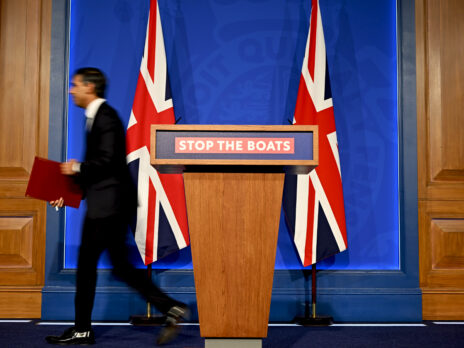At Holy Trinity Primary School in Ashton-under-Lyne, a Year 6 class have been waiting for a visit from their local MP. They are going to report on a litter pick they organised, and a patch of land they campaigned to have cleared by the council. Angela Rayner sails in, black mask and long black coat making her look a bit like Batman. She is not the type to kneel down and look at the children’s drawings. “See, this is politics,” she tells them. “You saw something you didn’t like, you took action.” Then she asks, “Who knows what partygate is?” Twenty-eight hands go up. “Who wants Boris to stay?” No one moves.
“I just wanted to give them respect,” she explains, while having a cigarette outside and leaning on her police car. (Rayner has travelled in one since becoming deputy leader of the Labour Party in 2020 and receiving death threats.) “Rather than a paternalistic ‘oh, you’re doing good’,” she continues. “It was more of an empowerment message: ‘Your aspirations and challenges are important.’”
There will be five or six cigarette breaks on a busy constituency day like this. Rayner is generally ahead of her entourage in order to get one in: she takes them leaning elegantly against walls, or round back-exits, like a rock star at the stage door.
It is late January, and after weeks of restrictions Rayner’s surgery has just started in person again, in the library in Droylsden, Greater Manchester, four miles east of the city centre. For security reasons it is by appointment only, though today’s single visitor was a no show. Instead, two veteran Labour councillors, Ged Cooney and Barrie Holland, come to chat about housing developments, among other things.
“We need to take back Scotland, Angela,” says Barrie, with a clench of the fist. “The difference is, now we look like we could win.”
“I want Boris to stay put,” says Ged. “He’s the best recruitment drive we’ve got.”
Rayner tells them she’s trying to tempt Rolls Royce to the area with its new production plant: the men seem quietly impressed.
“She is a campaigner,” Cooney tells me later. “I remember Barbara Castle speaking with the miners – Angela has that enthusiasm. A bit direct on some issues, but what do I want? I’m not asking someone to go up to parliament and just sit there. I’ve had my share of silent MPs. She is raising issues from her own background and life experiences.”
Is she popular with the old left? “She is what she is, and you have to get by with that. I deal with some of the fallouts as chair of the constituency Labour Party. We’re not always going to agree, but generally she’s liked because she’s opinionated. People who were not supporters were texting when she was at the dispatch box, and they were impressed.”
Before her surgery, Rayner talked to me without her aides around. Her manner had shifted slightly: her large, deep-set blue eyes locked in and her voice was softer. Her own family still live in the area. She has told the story of her childhood often: her mother was unable to read or write, and suffered from bipolar disorder, so that Rayner became one of her principal carers as a child. She became a mother herself at 16.
Rayner tells me when her eldest son was two she had to find her mother an assisted living place. Her mother was unable to cope after the death of Rayner’s grandmother, a stable figure upon whom the Rayner children had relied for hot meals and baths. After being diagnosed with cancer Rayner’s grandmother had asked her daughter to administer a fatal dose of morphine; she didn’t, but it prompted a crisis. Her mother is in a “good place” now, Rayner says: she watches PMQs, and worries about her daughter’s safety.
[See also: Andrew Marr: Tory hegemony is under threat]
Rayner knows that anyone with an interest has already heard this part of her story. Retelling it now serves a purpose other than disclosure; there is something unconscious, almost automatic about it. Her childhood is the spine of her politics: it shapes her thinking on education, the role of women in power, the economy, the divides within the left. It is the experience from which her ambition has arisen. It is not just the experience of poverty but of mental illness and unwieldy levels of responsibility placed on immature shoulders. As such, it sheds light on the emotional reasons someone might go into politics, or indeed seek power – in much the same way that Rayner started clubbing when she was 14: to put it all outward, to find definition from others, to prove something over and over, as though afraid it might all slip away.
I ask, as we drive to her next appointment, what she might have been had she not become a politician, expecting a playful answer – as a teenager, she wrote to British Airways to enquire about being an air steward. She replies quickly: “I think I would have been the secretary general of Unison.” Her aides explode with laughter. “Does that sound arrogant?” She looks surprised. But Rayner has never aimed for anything less than the top.
In the corridors of Westminster, an aide says, the deputy leader is impossible to keep up with because of her long legs. Today she is 5ft 10in, but only in her black vegan platform trainers, decorated with blue and red flowers, and a three-inch sole that flanges out like the rubber skirt beneath a hovercraft. She exploits a public obsession with the shoes of female politicians, which to date have been nothing like hers: Rayner’s are like toys, deliberate talking points. In 2015, six months after she was first elected, she tried to get her hands on a limited edition pair of Star Wars shoes (the heel was a little R2-D2) and believed herself to be on a pre-order list. When she discovered the shoes could only be bought in person, she wrote an angry complaint on Commons letterhead, which was duly shared with the press.
She probably wouldn’t make that mistake now, but the past year has damaged as well as boosted Rayner’s reputation. After Labour’s defeat in the Hartlepool by-election in March 2021 there was a failed attempt to demote her. The Labour leader Keir Starmer removed Rayner from her role as campaign manager, but after emergency negotiations she came out with the epic title she has now: shadow chancellor of the Duchy of Lancaster and shadow secretary of state for the future of work – in effect, a promotion.
When Starmer announced plans to reinstate the electoral college system for leadership elections last September, it was reported that Rayner was against it. At a party conference fringe event, she described the Tories as “homophobic, racist, misogynist… scum”. Starmer distanced himself (“He wasn’t refusing to defend me, he was just being Keir,” she says now). In interviews, when asked whether she wants to be prime minister, Rayner winkingly says she wouldn’t say no; facing Boris Johnson at the dispatch box in January, she told him there would soon be a vacancy for PM, and didn’t deny that she’d like to fill it.
[See also: Labour’s lost future: the inside story of a 20-year collapse]
The feeling, one source inside the Labour Party told me, is that Rayner went to last year’s conference like a leader-in-waiting and pitched it wrong, losing allies, and hasn’t recovered: “Her team wouldn’t worry about a front-page story about a row with Starmer if it advanced her short-term needs, but that’s a dangerous game to play.” As if the pair have recently sat down with a couples’ therapist, Rayner considers the reasons for their clashes. “I’d be very upfront and in your face if I think something’s wrong, whereas Keir would analyse it and be more subdued, and probably more reflective. I think we’ve got to a position where I understand that Keir’s way is not about him being dismissive, in the same way that Keir understands my way isn’t about me being combative or aggressive.”
She tells – and it is still rather moving – the story of their first meeting as leader and deputy, when the Prime Minister was “very poorly in intensive care”. She’d had Covid, Starmer hadn’t: the first part of the conversation considered what would happen if Johnson didn’t make it. The second discussed Rayner’s role if Starmer became unwell. “Tom Watson and Jeremy Corbyn had a very different relationship,” she says. (Their differences were such that deputy Watson voted against Corbyn when Owen Smith challenged him for the leadership in 2016.) “I absolutely believe that Keir would make a brilliant prime minister. Keir has the utmost respect for me in my role. I don’t feel patronised by Keir, I never have.”
The same Labour source tells me, however, that as a colleague Rayner is “hyper-vigilant”. “There is so much more going on below the surface. She won’t allow anyone to see her vulnerability – and why would you, if you spent the first 20 years of your life vulnerable every day? She is looking for the slight, the betrayal, the attack, all the time, and that is exhausting. She is the most hyper-vigilant politician I’ve ever met.”
There is, in her story, a through-line of self-loathing overcome: Rayner once revealed that she identified with the gawky loner Muriel in the film Muriel’s Wedding. She took night shifts in a care home when her eldest son was a baby, and trained as a Samaritan; she traces in care work, and her later union work, her first awareness of a natural “hit” that came from helping others. “It made me feel I had some self-worth – it was my natural drug. I wanted to be a counsellor because they’d helped my mum, and I’d seen the impact that you can have on someone just by listening to them. I thought, who am I to parachute into your life and say, ‘this is what your worth is’?”
As a politician, Rayner has focused on big state public provision, workers’ rights, identity and class. She would put a well-being index at the heart of government, following the example of Jacinda Ardern in New Zealand. “Our policies should make people feel they have more control, and support them in taking risks. We need a much more proactive model, rather than, ‘How do we get more mental health services in when we break you?’ I don’t want people to feel they have to be in crisis before they get the support.”
Rayner’s father (the day he walked out was “a very happy day”) was what she calls a “council house Tory”. Why did she not become one? “Because luck got me to where I am more than ability,” she says. “Now, some people might disagree and say, ‘Well, you’re an incredibly talented person, Ange.’” She says this without irony. “But I was lucky enough to be found by the union movement, which encourages you to be more combative.”
As branch secretary of Unison at Stockport Council she negotiated for 4,000 members: she once brought a case against a rude coroner who slammed doors on his staff. Coroner’s offices were surprisingly boring, she tells me: she thought there would be dead bodies but they’re kept elsewhere. Rayner has something of Victoria Wood’s command of language, finding the funny moment in the mundane.
Last year Gabriel Milland, a former special adviser to Johnson, said that Rayner was a difficult opponent for the Tories to deal with. What does she think he meant? “One of the things the Conservatives fear about me is that I say it how I see it, and that’s why the public believed in Johnson. You might not agree with what I say, but you know whatever I say is authentic, and people are looking for authenticity. That’s what they felt they were getting from Johnson. What they’re realising now is, he is authentic – he’s just an authentic liar.
“I think we should be open about why we come into politics, what drives us and what we want to do for other people. This is not about ‘poor little orphan Angie’, it’s about inspiring people to say: ‘My past informs my politics and my values.’ That’s all I want.”

In Ashton-Under-Lyne, we visited striking workers of the First Bus company in Oldham, campaigning for fair pay after a year of record profits. “You’ve not seen a picket till you’ve seen a miners’ strike picket,” said Councillor Barrie. Rayner grinned – she is both of that world, and at an ironic remove from it (“I love a good picket,” she said). In the darkening mist, 50 or so men greeted her after eight days of strikes; a single scab in hi-vis peered from the other side of the bus station.
The men had been starting shifts at 3am: a local Indian restaurant brought them samosas at lunch. One striker told me he admired Rayner’s forthrightness; another shrugged and said she was all right. There wasn’t an ecstatic welcome but when she started to talk she quickly touched the right buttons, saying they had put their lives on the line through Covid. She hit a winning phrase, absorbed the crowd’s energy, hit another, rising to a peak like a surfer, then slowed, maybe with a few ideas repeated, by which time no one cared. When we met again in Westminster ten days later, she said that a 9 per cent pay rise had been agreed: she wanted this noted down.
“To be the uber deputy, she could make a name for herself,” said my senior source within the Labour Party. “She could be the new John Prescott. Take on the tricky stuff, deal with the unions – face down Sharon Graham [the general secretary of Unite] over a bin dispute in Coventry. She’s got the authority because she comes from the shop floor. It would make her an invaluable part of the Labour government if Keir wins, and give her more authority if there’s a leadership election. But I don’t know if that’s the role she wants.”
At a sixth form college, its politics classroom decorated with a student’s poster of Andy Burnham styled like Russian revolutionary propaganda, Rayner took 15 questions from teenagers. She did not pause before each answer but launched in, her words generating ideas. “Misogyny is rife,” she said to a girl who asked about entering politics. “If you’re a woman or from an ethnic minority you’re going to get abuse.” She would not abolish tuition fees: she’d raise the threshold for repaying student loans and lower interest rates. She was best on the dishonesty prevailing in government: this is where she hits the high notes.
“If you wonder why I’m good on PMQs, you can see I practise on Ashton Sixth Form College,” she said as we crossed the car park. She brought Corbyn here in 2017 when she was shadow secretary of state for education. “He was like a rock star – kids lining the corridors. Jeremy’s problem was he never got anything done because he stopped to talk to everyone.” A former member of the Corbyn cabinet tells me that Rayner was, “like Keir, playing through the Corbyn years, realising that it wasn’t her time”. When she took on the education brief, she was the third person to hold it in one week, following a mass exodus of MPs.
Milland, who also worked at the department for education, describes Rayner as the most effective shadow education minister he has seen. “There is still a lot of the pragmatic Unison official in her,” he tells me. “She resisted getting sucked into Corbynite nonsense about ending academies and free schools – such as the absurd Corbynite-proposed National Education Service. She wanted to talk about things that she knew mattered – such as early years.”
[See also: Events have conspired to give Labour another chance. Will Keir Starmer seize it?]
At her constituency office above Ashton’s covered market, there are photos of Rayner and her team walking the local hills at Hartshead Pike. Her staff is the opposite of the old-fashioned office set-up of several middle-aged men and a younger woman to brighten the place up. There are five women, all picked on merit, she says, and not connections, and one older man, praised for his ability to stay civil even when dealing with complaints about dog turds.
In a side office, the team eat baked potatoes – Rayner’s is filled with tuna mayonnaise – and she engages in a weekly ritual. Every Friday she calls an elderly lady who we shall call Edna, with whom she was paired on a charity phone-a-friend scheme before she became deputy leader. The call is long: it begins with an enquiry about tomato soup and takes in the shrinkflation of the Cadbury’s Flake. Edna has a fire in her: “They’re saying it’s smaller for the sake of our health!” Rayner, picking at her potato with a fork, says, “You and me are kindred spirits.” They have never met and Edna knows her only as a local mum of three. She wouldn’t vote for Rayner even if she knew who she was – Edna is a Tory. Edna once mentioned she’d seen that deputy Labour leader on telly, and she “can’t talk properly”.
I meet Rayner in her Westminster office the day after Starmer is mobbed by a crowd chanting Jimmy Savile slurs. Outside the lift, the Labour leader is telling a colleague that it looked worse on TV than it was. “Yeah, Keir does not let things like that faze him,” Rayner reflects when I tell her. “He’s got a real sense of moral obligation. You can’t shake him in that respect.”
Rayner painted her office during a nine-hour Zoom conference with Labour’s National Executive Committee. (She is known to do video calls with her camera off – this annoys Starmer, she adds – because a cataract incurred as a child is irritated by the screen.) She chose teal for the walls, and added a sequinned unicorn cushion to her sofa. “The sensory room, I like to call it. Party officials come in here to moan, because they know nothing leaves the four walls.” She has a bust of the Labour founder Keir Hardie, his nose chipped: she coloured it in with black felt tip.
Rayner is a fourth-wall breaker of sorts, making the business of being an MP sound funny at times. Of Johnson’s overtures across the dispatch box – he flirts, blushes, flatters – she says: “You can’t beat a puppy so he has to compliment me in a backhanded way.”
“I know that he doesn’t prepare. I don’t think he gets to the dispatch box and thinks, ‘I’m just going to lie to the public’. He just spouts whatever comes into his head. That’s why he comes out with fluffy words that he learned at his school. Whereas Keir over-prepares. He’d never wing it.”
How long has Johnson got? “We’ve got to the point where it’s a question of, do you want the edgy, naughty boyfriend, but, actually, in the long run he’s toxic? Or do you want the stable one who says: ‘I’m not going to be as racy as that, but I will provide you with a family and nurture you.’ As a nation, we have to decide. Do we want a grown-up, or someone who’s going to throw you in a racing car and thrill you to near-exhaustion and death?”
Although Rayner is always “on”, you feel it when she hits upon her real causes: in the rising energy, the repetition, the wide eyes. In Portcullis House, that moment comes on the subject of credit. “There’s a poverty trap in this country,” she says. “I can get credit dead easy, but I don’t need it. If I need a washing machine, I’ll go out and buy one. My friend, who hasn’t got good credit because she’s got a low-paid job, can’t – every single bit of her wage goes into paying her bills. She’d pay considerably more than me for the same machine, so I have to buy one for her.
“The energy hikes show how out of touch the government is. If you’re on a prepayment meter – which most people who are on poverty wages are – you can’t shop around. I’m paying less for my energy than somebody who really needs that support. When that hike in energy costs comes, they’re powerless to do anything about it, and the government doesn’t recognise how that tips people over the edge.”
How do the Tories keep people voting against their own interests? “They’re constantly suggesting that people are in poverty because it’s somehow their fault. The majority of the time, it’s not. I know that I did not ask to be born into poverty. I needed the levers of state to support me. If you go and choose to rob a car, that’s different: you chose that, and there’s consequences.”
Like Tony Blair, Rayner seems to be tough on crime. “You should be hardline,” she recently told the comedian Matt Forde on his Political Party podcast. “It’s not just ‘Oh, you’ve been burgled, here’s a crime number.’ I want you to beat down the door of the criminal and sort them out.” Her suggestion to him that the police should “shoot terrorists and ask questions second” was widely condemned.
In the political analysis of Dominic Cummings, at least, this opinion could appeal to swing voters who, he thinks, are more left than Blairites on the economy and more right than Tories on crime. Last year Cummings tweeted: “Red wall extremely vulnerable to a woman LAB leader focused ruthlessly on violent crime & the small business ecosystem abused by Tories for a decade. Move HQ to Midlands Tory-held marginal, ‘live in the village’, you’ll quickly turn Tory MPs to civil war.” Though he may have been talking about Lisa Nandy.
Rayner regularly praises the Blair government, which came to power when her son was three months old. He was a “naughty” child: its Sure Start nurseries taught her about positive reinforcement (“I spent 90 per cent of the time telling Ryan what not to do – I thought it was obvious that I loved him”).
In 2020, on Ryan’s 23rd birthday, she posted a picture of mother and son with her political hero Gordon Brown at Labour conference in 2007. She’d lobbied Brown once as a home carer on the subject of equal pay. “He was a pragmatist, able to deliver socialism in a way that was impactful on people’s everyday lives. People just saw it as fairness. I cannot tell you how transformative the Working Tax Credit was for young girls like me. Before then, it would have cost me too much to go to work, but [it] catapulted us all into employment.”
[See also: The cost-of-living crisis will define 2022 – Labour needs answers now]
My Labour source tells me that this New Labour narrative of Rayner’s is “gold dust”: “Keir should make more of it than he is doing. She can tell the story of the last Labour government in a way that is compelling and convincing. To have overcome those inequalities and make it as an MP is remarkable in itself. You cannot take that away from her – she is streetwise enough to know that the guilty, liberal-left middle classes who are overcome with nostalgia will always [respect] her story. It has been used to smooth away what other people would be killed for – strategic blunders in terms of positioning and behaviour.”
Rayner tells me she is impatient for government. “My biggest regret is that I’ve been in opposition for nearly seven years. I’ve had to try and convince the government of things that I know are wrong, and I’ve not been able to do all that we could have achieved. The Sure Start Plus model, for example, is on a shelf. That’s our fault. Many of our ex-voters blame Labour for Johnson getting in, because they said we didn’t give them an alternative. I accept that criticism – you can’t say the voters were wrong. Hopefully, they’ve seen that we are different. We are reflective and respectful, and we’re going to put forward a government-in-waiting that people can vote for.
“This government is chaotic. But we can’t just hope that they implode and the voters say, ‘well, you’re less crap’. We have to recognise that we failed massively in 2019. If we can’t then we let down the public – again. I’m not prepared to do that. The stakes are too high.”
How does Labour win? “We’ve got to articulate this in language that people understand – we can get very technocratic. Most people don’t go rooting through manifestos. It’s about how we make people see that Labour is the party that has always stood for opportunity and aspiration. The welfare state, the NHS, social housing – these made people’s lives better. We can be radical but also pragmatic. Radicalism isn’t recklessness.
“We’ve got to be proud of our past achievements, which the Labour Party is never good at. If we achieve 96 per cent, we’ll go on about the 4 per cent we didn’t. It infuriates me. I’ll never, ever apologise for the last Labour government. Did we get everything right? No, of course not! But we did so much!”
[See also: Andrew Marr: Tory hegemony is under threat]
When Rayner used to go clubbing – she caught the Hacienda at the tail end of its life – she learned to approach anyone and have a conversation with them. In fact, there is something about her energy, an edgy intensity, that reminds you of someone you might meet on a night out. She used to be tired by midnight, being only 14, but would push through, because she was pretending to be older.
These days she is in London Monday to Thursday, and in her constituency on Friday and Saturday. But on Sundays Rayner does not leave her house – sometimes not even her bedroom. Last weekend, she binge-watched the entire Superman & Lois series. She does not dress, or put on make-up, or wash.
At night, when she can’t sleep, Rayner listens to audiobooks and podcasts about serial killers. She has insomnia – a family thing: she can’t wind down – but true crime is a surprising choice. In October last year, a 36-year-old man was given a suspended prison sentence after sending an email in which he told her to “watch your back and your kids”. She has panic buttons in her house, and a device on her watch which tells her when someone is at her front door.
Why does she listen to true crime in the dead of night? “I’m just intrigued by extreme behaviour,” she says. “I mean, the idea of being able to murder someone, if you think about what you’d have to do to cross that line. It takes my mind off everything that swirls around in my head, and then I fall asleep.”
She is one of those people who buys a house and has to do it up. She still lives with her ex-husband and two younger sons, aged 12 and 13, in a 1920s villa in a Manchester suburb, with the hills on one side and an impressive view of the city on the other. (It was recently reported that she is in a relationship with Sam Tarry, the Labour MP who ran Rayner’s campaign to become deputy leader.) Her 13-year-old is registered blind. Her granddaughter – Rayner became a grandmother at 37 – is non-speaking autistic and lives locally.
The main gathering area is the bit of the house she is most proud of – a big white kitchen and extension which she painted herself on an internal scaffold using 50 litres of paint. In the middle of the room is the largest kitchen island I’ve ever seen, in white marble. She hovers a finger over it – “watch this” – and from its centre rises a slim robot extractor fan, sinking down again on command. The tiles on the floor are much larger than regular tiles and therefore hard to place. “Guess how much it cost to lay my tiles,” she asks. “Guess!” Her boys and her staff gather around the island, as she pours the white wine. Rayner had a banner up on the ceiling for a while, she says, which read, “This is a gathering not a party.”
“Everyone should be able to have nice things,” she had told me in Westminster. “I want you to have a lovely house where you feel pride in it, not ‘I’ve got a roof over my head, so I should be thankful’. Why should you have the minimum?”
This interview was originally published on 23rd February 2022
[See also: Tony Blair: Without total change Labour will die]
This article appears in the 23 Feb 2022 issue of the New Statesman, Darkness Falls






